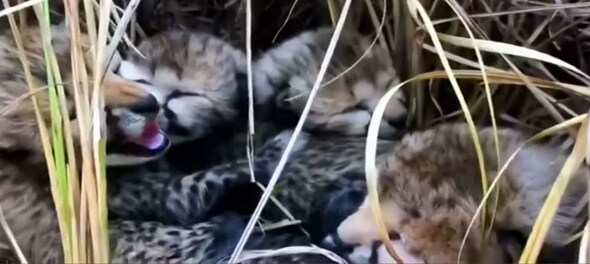
Kuno National Park's forest officials on Wednesday (September 13) reported that India's lone cheetah cub — a remarkable milestone as the nation's first cheetah birth in 75 years — is now thriving after a severe episode of heat stress. The female cub, now 5.5 months old, stands as the sole survivor from a group of four cubs that tragically perished during the scorching heat of May.
Having spent more than 100 days in close proximity to her mother, the cub has exhibited remarkable vitality, steadily gaining weight and following a standard growth trajectory. Born on Indian soil, this young cheetah holds the promise of a brighter future for cheetah conservation in the country, according to the park authorities.
Although the cub remains physically near her mother, the two have been kept separately in adjacent enclosures, separated by a 30-metre-long fence. This decision to separate them was made in June after attempts to reunite them were met with the mother's rejection. Over the past three months, vigilant forest officials have closely monitored the two felines using field cameras.
Experts emphasise that the bond between a mother and her offspring can be intricate, particularly in carnivorous species like cheetahs, especially in the unique circumstances at Kuno National Park. The risk of maternal rejection is ever-present post-separation, which necessitates prompt intervention to prevent potential aggression towards the young one.
To minimise this risk, officials at the park adopted a gradual approach to reintroduce the cub to her mother after an initial eight-day separation in May. Initially, they placed them in separate enclosures (bomas) with a dividing fence to gauge the mother's response to her young one. However, the signals were mixed — while the cub attempted to approach her mother, the latter distanced herself after a brief sniff.
During the second reunion attempt a few days later, the mother exhibited aggressive behaviour when the cub was released into her enclosure. Though the little one remained unharmed, it was immediately removed. Since then, the two have been housed separately in soft release bomas, separated by a fence that allows them to maintain visual contact.
Given that the cub is being hand-raised, the park management will need to prepare it for eventual survival in the wild. But before that, it will be moved to a much larger enclosure.
This marks one year since India undertook a historic translocation, airlifting a total of eight cheetahs from Namibia in September 2022 to revive the species within the country, followed by an additional 12 cheetahs from South Africa in February.
In March, one of the female Namibian cheetahs, originally named Siyayya but later renamed Jwala, gave birth to four cubs. Tragically, three of them succumbed two months later when temperatures soared to over 45 Celsius in Kuno, Madhya Pradesh, in May. The fourth cub was found weak and dehydrated, weighing just 1.5 kg, when it was rescued and placed under veterinary care.
In the first year following the translocation, as many as six cheetahs and three cubs have perished at Kuno National Park. Currently, all 14 remaining cheetahs, including the lone India-born cub, are housed in enclosures after being recaptured from the wild two months ago.
The removal of their radio collars was necessary due to skin issues, which proved fatal for three of them in July. These deaths were attributed to the development of a 'winter coat,' a thick skin layer that African cheetahs develop before winter, proving to be detrimental in India's humid monsoon climate.
While extended captivity is causing stress to these animals, officials are cautious about potential infections and are awaiting the end of the monsoon season to release the cheetahs back into the wild.



